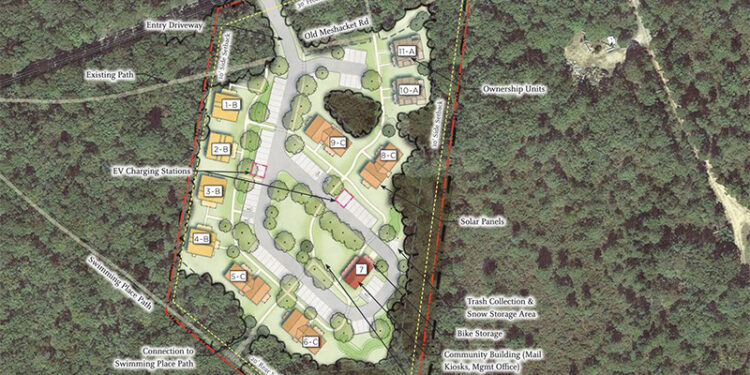Meshacket Commons cleared another bureaucratic hurdle Wednesday after a public hearing hosted by the Edgartown zoning board of appeals yielded zero opposition to the proposed affordable housing development.
The project, located at 38 Meshacket Road across from the former landfill, would be the first major affordable housing project planned in decades for the town of Edgartown. In November, the Martha’s Vineyard Commission unanimously approved the development after a two-month hearing process.
The project is being spearheaded by the Island Housing Trust and Affirmative Investments, a Boston-based affordable housing developer. At Wednesday’s hearing, Craig Nicholson of Affirmative Investments led an overview of the plan, which includes 36 long-term rental units, four homeownership units, and a community building for events and gatherings.
Each unit would be entirely electric, he explained, with solar arrays on each of the rental units and the community building. Homeowners would have the option to install solar panels on their housing units, but don’t automatically receive them.
In response to the commission’s feedback last fall, the community house will offer free WiFi to residents or any other community member in need of reliable internet access. The landscaping plan had also been formulated with the help of the Polly Hill Arboretum’s plant selection guide, to best preserve the existing vegetation in the area.
Mr. Nicholson said that after a year of living in the developments, residents would have the opportunity to give feedback in a survey about what they’d like to see in the development.
“We thought it might be nice to see what they choose instead of what we decide in a vacuum,” he said. “To get everyone involved and have a stake in the community they create.”
Having won over the commission after lengthy discussions on traffic, wastewater and access to broadband internet, the project had little else to prove. The Edgartown police chief, fire chief and facilities manager had all expressed verbal or written approval of the project, zoning board assistant Lisa Morrison said.
The only public question came from Susan Drogan about whether the development would contribute to light pollution in the area.
The only street lights would be downward-facing solar bollards, project architect Alanna Jaworski replied, with the entire plan being dark-sky compliant. With no public opposition, the conversation moved to the board.
“I think it’s going to be an incredible asset to the town,” board member Pam Dolby said. “I almost want to move in there myself.”
Zoning board alternate Robin Bray had several environmental concerns for the development, from irrigation to landscape maintenance.
“Noise from leaf blowers is a huge problem on the Island,” she said, arguing that the firm should consider using all-electric landscaping equipment.
The project has no plans for an in-ground watering system, Mr. Nicholson responded, and all landscaping will be overseen by a property manager, who can look into electrical equipment.
Ms. Bray also raised the question of whether the development, which plans to use asphalt roadways, should consider dirt or bluestone roads to minimize petroleum runoff into the Island’s waters. Both the zoning board and the applicants concluded that maintenance would be too cumbersome.
“I just know what a nightmare it is as the season goes on of maintaining a dirt road and the potholes,” board member Thomas Pierce said. “I can understand why they went to the asphalt. I wouldn’t support putting that kind of condition on a property supporting 70 cars.”
The proposal passed the zoning board of appeals unanimously.
“There was absolutely nobody today who appeared in opposition to this program,” chairman Martin Tomassian said. “You’ve done a nice job.”




